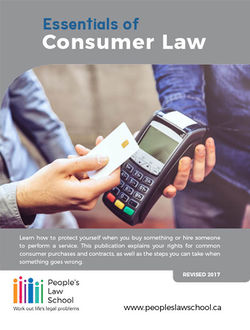Consumer Law Essentials: Difference between revisions
Drew Jackson (talk | contribs) No edit summary |
Drew Jackson (talk | contribs) No edit summary |
||
| Line 25: | Line 25: | ||
** [[Making a Contract#How a contract is created|How a contract is created]]{{·}} [[Making a Contract#Who can make a contract|Who can make a contract]]{{·}} [[Making a Contract#The contract itself|The contract itself]] | ** [[Making a Contract#How a contract is created|How a contract is created]]{{·}} [[Making a Contract#Who can make a contract|Who can make a contract]]{{·}} [[Making a Contract#The contract itself|The contract itself]] | ||
*'''[[Preventing Consumer Problems]]''' | *'''[[Preventing Consumer Problems|Preventing Problems]]''' | ||
** [[Preventing Consumer Problems#Do your research|Do your research]]{{·}}[[Preventing Consumer Problems#Negotiate with confidence|Negotiate with confidence]]{{·}} [[Preventing Consumer Problems#Have a contract|Have a contract]]{{·}} [[Preventing Consumer Problems#Read and understand any contract|Read and understand any contract]]{{·}} [[Preventing Consumer Problems#Don't rush the decision|Don't rush the decision]] | ** [[Preventing Consumer Problems#Do your research|Do your research]]{{·}}[[Preventing Consumer Problems#Negotiate with confidence|Negotiate with confidence]]{{·}} [[Preventing Consumer Problems#Have a contract|Have a contract]]{{·}} [[Preventing Consumer Problems#Read and understand any contract|Read and understand any contract]]{{·}} [[Preventing Consumer Problems#Don't rush the decision|Don't rush the decision]] | ||
*'''[[If There Are Consumer Problems]]''' | *'''[[If There Are Consumer Problems|If There Are Problems]]''' | ||
** [[If There Are Consumer Problems#Understand your legal rights|Understand your legal rights]]{{·}} [[If There Are Consumer Problems#Step 1. Decide what outcome you are seeking|Step 1. Decide what outcome you are seeking]]{{·}} [[If There Are Consumer Problems#Step 2. Collect your information|Step 2. Collect your information]]{{·}} [[If There Are Consumer Problems#Step 3. Contact the other party|Step 3. Contact the other party]]{{·}} [[If There Are Consumer Problems#Step 4. Send a complaint letter|Step 4. Send a complaint letter]]{{·}} [[If There Are Consumer Problems#Step 5. Contact a consumer protection agency|Step 5. Contact a consumer protection agency]]{{·}} [[If There Are Consumer Problems#Step 6. Consider legal action|Step 6. Consider legal action]] | ** [[If There Are Consumer Problems#Understand your legal rights|Understand your legal rights]]{{·}} [[If There Are Consumer Problems#Step 1. Decide what outcome you are seeking|Step 1. Decide what outcome you are seeking]]{{·}} [[If There Are Consumer Problems#Step 2. Collect your information|Step 2. Collect your information]]{{·}} [[If There Are Consumer Problems#Step 3. Contact the other party|Step 3. Contact the other party]]{{·}} [[If There Are Consumer Problems#Step 4. Send a complaint letter|Step 4. Send a complaint letter]]{{·}} [[If There Are Consumer Problems#Step 5. Contact a consumer protection agency|Step 5. Contact a consumer protection agency]]{{·}} [[If There Are Consumer Problems#Step 6. Consider legal action|Step 6. Consider legal action]] | ||
Revision as of 22:14, 25 April 2017

|
|
This is a Clicklaw Wikibook, a collaborative, plain language legal publication that is updated as a wiki and can be printed or downloaded. |
|
|
This Wikibook is used in Law-Related Lessons from People's Law School. |
|
|
Download the full Wikibook in PDF. |
|
|
Customize: take what you need, leave the rest (learn more). |
Consumer Law Essentials from People's Law School describes how to protect yourself when you buy something or hire someone to perform a service. This publication explains your rights for common consumer purchases and contracts, as well as the steps you can take when something goes wrong.
Contents
- Resources
Copyright & Disclaimer
![]() Consumer Law Essentials © People’s Law School is, except for the images, licensed under a Creative Commons Attribution-NonCommercial-ShareAlike 2.5 Canada Licence.
Consumer Law Essentials © People’s Law School is, except for the images, licensed under a Creative Commons Attribution-NonCommercial-ShareAlike 2.5 Canada Licence.
At People's Law School, we believe accurate, plain English information can help people take action to work out their legal problems. This resource explains in a general way the law that applies in British Columbia. It is not intended as legal advice. For help with a specific legal problem, contact a legal professional. Some sources of legal help are highlighted in the "Where to Get Help" section.
About People's Law School

People's Law School is a non-profit society in British Columbia providing free education and information on the legal problems of daily life.
| |||||||||||||||||||||||